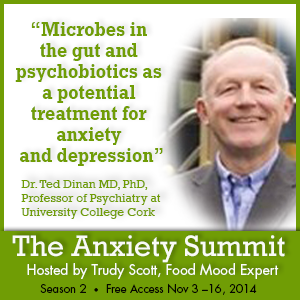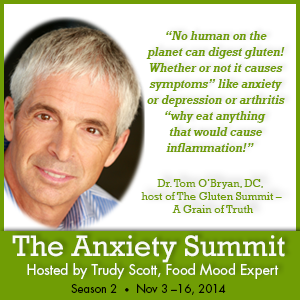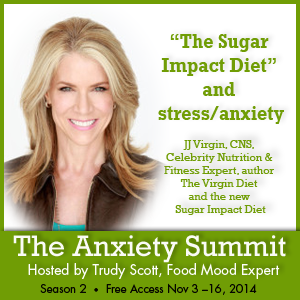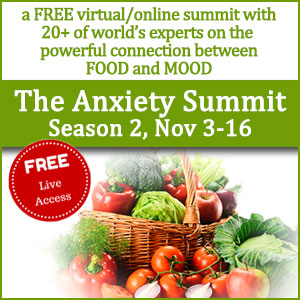
Dr. Ted Dinan, MD, PhD. Professor of Psychiatry at University College Cork was interviewed by host of the Anxiety Summit, Trudy Scott, Food Mood Expert and Nutritionist, author of The Antianxiety Food Solution.
Microbes in the gut and psychobiotics as a potential treatment for anxiety and depression
- Varied ways in which anxiety presents
- Anxiety as a co-morbid condition e.g. irritable bowel syndrome
- Microbes in the gut and the influence on emotional activity
- Non-pharmacological approaches to treating anxiety
- Psychobiotics as a potential treatment and the newest research in this area
Here are some snippets from our interview
Now the brain-gut axis is an axis that we learned more about over the decade or 2, how does the brain communicate with the gut, how does the gut communicate with the brain, and the view of irritable bowel syndrome is that it is as I say a brain axis disorder, an exceedingly common disorder, up to at least 50 percent and some studies suggest much higher rates in terms of the presence of psychiatric symptoms in patients with irritable bowel syndrome. The general view is that at least 50 percent of patients with irritable bowel syndrome have a coexistent or comorbid depression or anxiety.
We’re gradually I think learning more about the pathology underlying irritable bowel syndrome and we and others have published a number of studies show that for instance patients with irritable bowel syndrome have high levels of cytokines. Now cytokines are chemicals that are produced by the immune system and there are certain cytokines that are caused pro-inflammatory. They give rise to inflammation or are the product of inflammation. And certainly there is now good evidence that many patients with irritable bowel syndrome do have very high levels of these pro-inflammatory molecules in their blood stream. The molecules would be molecules like interleukin 6 and CNF-alpha.
Here is the quote from Dr. Dinan’s article that was co-written with Dr. John Cryan and called Psychobiotics: How Gut Bacteria Mess with Your Mind
In the 20th century the major focus of microbiological research was on finding ways to kill microbes by antibiotics. This century the focus has changed somewhat with the recognition of the health benefits of bacteria, not just from an immunity perspective but from a mental health one.
Here is some of Dr. Dinan’s research:
co-morbidity with mood disorders such as depression and anxiety is common in IBS
Psychobiotics: a novel class of psychotropic.
Here, we define a psychobiotic as a live organism that, when ingested in adequate amounts, produces a health benefit in patients suffering from psychiatric illness. As a class of probiotic, these bacteria are capable of producing and delivering neuroactive substances such as gamma-aminobutyric acid and serotonin, which act on the brain-gut axis. Preclinical evaluation in rodents suggests that certain psychobiotics possess antidepressant or anxiolytic activity. Effects may be mediated via the vagus nerve, spinal cord, or neuroendocrine systems. So far, psychobiotics have been most extensively studied in a liaison psychiatric setting in patients with irritable bowel syndrome, where positive benefits have been reported for a number of organisms including Bifidobacterium infantis. Evidence is emerging of benefits in alleviating symptoms of depression and in chronic fatigue syndrome. Such benefits may be related to the anti-inflammatory actions of certain psychobiotics and a capacity to reduce hypothalamic-pituitary-adrenal axis activity. Results from large scale placebo-controlled studies are awaited.
This is the recent resistance training anxiety study I mentioned: The anxiolytic effects of resistance exercise
This research has shown that resistance training at a low-to-moderate intensity (<70% 1 repetition maximum) produces the most reliable and robust decreases in anxiety.
If you are not already registered for the Anxiety Summit you can get live access to the speakers of the day here www.theAnxietySummit.com



